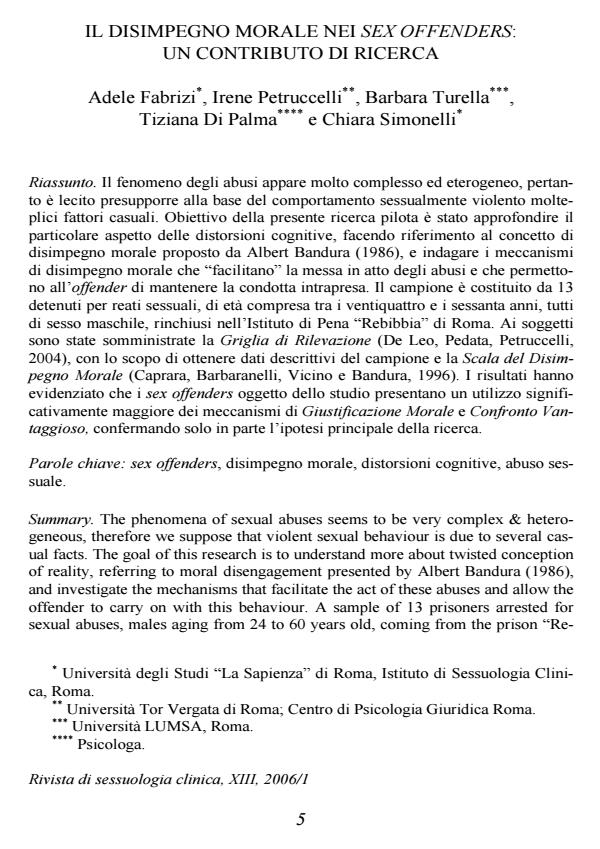Il disimpegno morale nei "sex offenders": un contributo di ricerca
Journal title RIVISTA DI SESSUOLOGIA CLINICA
Author/s Adele Fabrizi, Irene Petruccelli, Barbara Turella, Tiziana Di Palma, Chiara Simonelli
Publishing Year 2007 Issue 2006/1 Language Italian
Pages 11 P. 5-15 File size 202 KB
DOI
DOI is like a bar code for intellectual property: to have more infomation
click here
Below, you can see the article first page
If you want to buy this article in PDF format, you can do it, following the instructions to buy download credits

FrancoAngeli is member of Publishers International Linking Association, Inc (PILA), a not-for-profit association which run the CrossRef service enabling links to and from online scholarly content.
The phenomena of sexual abuses seems to be very complex & heterogeneous, therefore we suppose that violent sexual behaviour is due to several casual facts. The goal of this research is to understand more about twisted conception of reality, referring to moral disengagement presented by Albert Bandura (1986), and investigate the mechanisms that facilitate the act of these abuses and allow the offender to carry on with this behaviour. A sample of 13 prisoners arrested for sexual abuses, males aging from 24 to 60 years old, coming from the prison Re- bibbia in Rome, formed the selection for the test. The subjects were given the following tests the Griglia di Rilevazione (De Leo, Pedata, Petruccelli, 2004), in order to obtain a description of the subjects; and the Scale of moral disengagement (Caprara, Barbaranelli, Vicino e Bandura, 1996). The results point to the fact that for the most, the sex offenders undergoing the test make a better use of the mechanism of Moral Justification and Advantageous Comparison, not confirming therefore the true conjecture of the research. Key words: sex offenders, moral disengagement, cognitive distortions, sexual abuse.
Adele Fabrizi, Irene Petruccelli, Barbara Turella, Tiziana Di Palma, Chiara Simonelli, Il disimpegno morale nei "sex offenders": un contributo di ricerca in "RIVISTA DI SESSUOLOGIA CLINICA" 1/2006, pp 5-15, DOI: